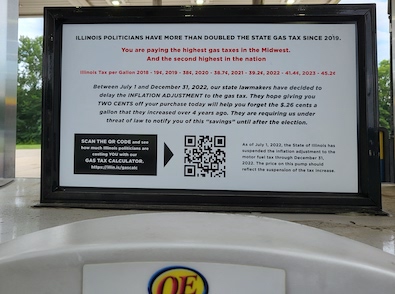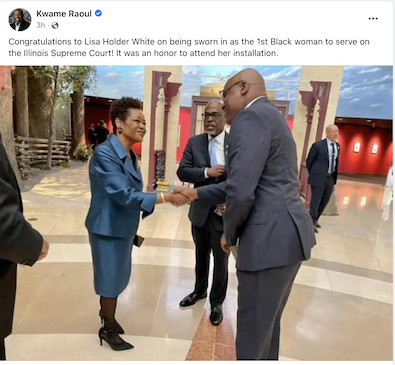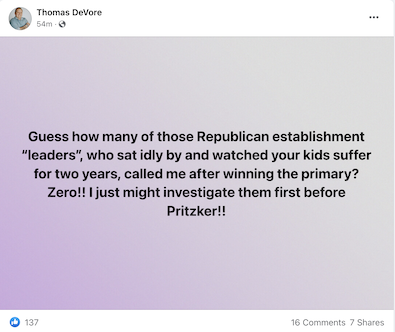Question of the day
Friday, Jul 8, 2022 - Posted by Rich Miller
* Synopsis of Rep. Deb Conroy’s newly introduced HB5766…
Amends the Firearm Owners Identification Card Act. Provides that a minor who causes or attempts to cause physical self-harm or harm to another is subject to the denial of an application for or the revocation and seizure of a Firearm Owner’s Identification Card. Provides that until the age of 24 years, such a person is presumed to be a person whose mental condition is of such a nature that it poses a clear and present danger. Provides that a physician, clinical psychologist, qualified examiner, law enforcement official, school administrator, or other person who has knowledge of a minor causing or attempting to cause physical self-harm or harm to another shall report the incident to the Department of Human Services. Effective immediately.
* Rep. Conroy explained her proposal to NBC 5…
This will give us that added layer of protection, and kind of close a loophole within the Red Flag Law and hopefully make some difference while we try to figure out socially what is happening in our country.
* You’ll recall earlier this year that a man was arrested for allegedly making threats against Rep. Conroy. He apparently paid his bond, but his movements are being tracked as he awaits trial. Conroy told me this today…
As I was driving to Wisconsin and working with staff to file this, I was contacted by the county and told the man arrested in my case had penetrated the perimeter of my home. A few minutes later, my son called to say the police were at my home and needed to confirm I was safe. I had protection and still do. I had warning. These innocent families and so many around the country have no warning and no protection.
She later received an all-clear from the county.
* The Question: Do you support this bill? Take the poll and then explain your answer in comments, please.
49 Comments  
|
* Dick Uihlein has contributed $5 million more to Dan Proft’s People Who Play By The Rules PAC. That brings Uihlein’s total to $12 million.
* The Republicans have 18 out of 59 Senate seats. They don’t generally demand special sessions to pass actual bills…

* From a reader: “The local gas station here in Springfield on Toronto Road has something a little bigger than a sticker about the gas tax. This 11×17 sign is on top of all of the pumps”…

Heh.
* Establishment-backed candidate concedes defeat…
By a margin of just 69 votes, Connie Cain is on track to be the Republican nominee for the 66th House District in Illinois after her opponent, Arin Thrower, conceded the race Wednesday evening.
Cain, a longtime accountant living in Gilberts, declared victory in a Facebook post Wednesday evening as the unofficial results across Kane and McHenry counties showed Cain with 3,439 votes, or 51% of the vote, and Thrower with 3,370 votes, or 49%.
Yep. This does say it all…

Cain will face Rep. Suzanne Ness (D-Crystal Lake) in the fall.
* New state Senator appointed and sworn in…
Kris Tharp, a captain and jail administrator for the Madison County Sheriff’s Office with nearly 25 years of law enforcement experience and a life-long volunteer in the Metro East, was sworn in to represent Illinois’ 56th Senate District Friday.
“I’m truly honored and humbled by this entire experience,” said Tharp (D-Bethalto). “We have a lot of important issues to explore this year, and I’m eager to serve the residents of the 56th District in this new role.”
Tharp has worked through the ranks of the Madison County Sheriff’s Office and dedicated his life to improving public safety for communities throughout the Metro East. In addition to his roles as a captain and jail administrator, Tharp serves as a Deputy Commander for the Major Case Squad of Greater St. Louis.
In 2018, Tharp founded Madison County Triad, a partnership between the Madison County’s Sheriff’s Office, area service providers and older residents to improve the safety and quality of life of seniors in the community. He serves as president for the organization.
He is a graduate of the FBI National Academy. To highlight his law enforcement credentials, Tharp is an active member of the FBI National Academy Associates, Police Benevolent and Protective Association 118, Illinois Sheriff’s Association, Illinois Correctional Association, International Association of Chiefs of Police and the International Homicide Investigator’s Association.
He is a life-long resident of the 56th District. He lives in Bethalto with his wife, Jaime. The couple has two adult sons.
Tharp, who is familiar with government work in Springfield from his time working on the Illinois Elder Abuse Task Force, is excited to return to the Capitol this fall in a new capacity and advocate for the needs of working families.
The 56th Senate District includes all or parts of Alton, Bethalto, Caseyville, Collinsville, East Alton, Edwardsville, Elsah, Fairview Heights, Glen Carbon, Godfrey, Granite City, Hartford, Maryville, O’Fallon, Roxana, South Roxana and Wood River.
He replaces former Sen. Rachelle Aud Crowe, who resigned after she was confirmed as the region’s new US Attorney.
His Republican opponent Erica Harriss responds…
This appointment has no real bearing on the upcoming election. Chicago Democrat Elites, like Senate President Don Harmon, hand-picked Senator Crowe’s replacement months ago. Ultimately there will be an election to decide who will be the next state senator from the Metro East.
“Voters are going to have the final say in November and there is a very stark contrast between what I stand for and what the Chicago Elite have planned. My message resonates with families who are frustrated with the cost of everything, who are anxious about their children’s future, and who are hungry for leadership,” Erica Harriss, Candidate for State Senate, stated.
“The Democrat Elites have chosen a candidate who will support them and their policies which keep our taxes high, send our high-paying energy jobs to other states and overseas, and release dangerous criminals onto the street.” Erica continued: “That’s not a platform I would want to run on, and this election will be a referendum on the failed leadership of the Democratic Party.”
“Voters need to hear that there is hope for the future of our state and that with good policy we can make great strides together. I have a proven record of voting to safeguard our future by lowering taxes, funding law enforcement, and standing up for local control,” said Harriss.
* New state Supreme Court Justice appointed and sworn in…
A week after Ketanji Brown Jackson was sworn in as the first Black woman on the U.S. Supreme Court, a comparable trail was blazed Thursday into Illinois’ top court.
Lisa Holder White took the oath in Springfield to become the first Black woman to serve as a justice on the Illinois Supreme Court in the institution’s 203-year history.
Holder White was selected by retiring Justice Rita Garman as her replacement in the central Illinois district, with the six other jurists on the court approving the appointment of the Decatur Republican this spring.
AG Raoul…

28 Comments  
|
A descent into darkness, hate and terror
Friday, Jul 8, 2022 - Posted by Rich Miller
* First, a brief primer on Highland Park…
* NPR…
The cartoonized video of an armed Crimo in a bloody standoff with police is one example that researchers point to when explaining how some violent, fringe online communities come to influence users’ behavior.
“There’s this kind of tendency to ‘gore-post,’ which is essentially to post shocking, graphic, violent imagery in an attempt to draw some kind of camaraderie between the users in these spaces,” said Melanie Smith, head of research at the Institute for Strategic Dialogue US. Crimo appears to have been active in at least one large so-called “gore forum.”
Experts agree that it’s impossible to determine Crimo’s mental health condition from his online content. Newhouse said that the darker alternate reality communities and gore forums are designed to plant the seeds of hopelessness, nihilism and lower one’s natural reluctance to commit violence. He said he noted an inflection point on Crimo’s timeline that may indicate he had fallen farther away from real-world interaction and further into these online subcultures.
“From what we can tell, he became extraordinarily alienated from both his music audience and his in-person social networks, but clearly began exhibiting the signs of being immersed in these much much deeper Internet communities,” he said.
Crimo was a rap artist who released music online. Newhouse said the style of Crimo’s latest album was also markedly different from earlier ones.
“Something was going on in that period of time,” he said.
* The framing of that NPR article has been sharply criticized…
* And some of that criticism has included at least one of the experts quoted by NPR…
I happened to have been in touch with the same experts this NPR article quoted, and I reached out to one of them, Sarah Hightower, an independent researcher who specializes in the far right and online extremist movements, to hear what she thought about the piece.
She was worried about how it had been framed.
“You have this entire community, and they’re scared,” she told me. “And now it looks like they’re essentially being told, ‘Oh no, y’all are overreacting because it’s just edgy white boy sh*t.’”
She had explained to the writer, and in all of her interviews, that you can’t separate ideology and bigotry from these online subcultures, she told me, and she shared evidence of the suspect’s racist and antisemitic posts in hate forums.
The suspect was part of a “gore forum,” a place for people to post things like beheadings. He was part of the Nazi Catboy movement, which is… hard to explain. He was part of the far-right anime fandom movement. Hightower confirmed that he had posted on an online forum conveying Holocaust denial, overt antisemitism, the desire for a new Holocaust as well as a desire to wipe out Black people and Asian people. His last and only remaining post on Facebook before it was shut down said simply, “You are all sinners.”
Not only was the suspect visible at multiple Trump rallies, but a Highland Park resident who knew of his activity and called him a “known agitator” said he was known for violently attacking counter-protestors and referring to Black Lives Matter supporters as “monkeys.” According to a Facebook post by this resident, she had previously informed the police, who she says did nothing.
While all hateful communities are complex in their own ways, there is a common bigotry that unites and drives them, and too often spills out into real-world attacks.
Each group is propelled by bigotry against the vulnerable, an ideology of destruction, and ideologies built on white and Christian supremacy. The explicit goal is to cause terror and confusion. Like all terrorists, they want vulnerable populations to suffer not just the physical toll of a mass shooting, but the emotional toll that then follows their attacks.
While we may never fully understand the full motive behind this specific attack, and it would be wrong to label it simply as “antisemitic,” a simple fact remains: The suspect was active in many online breeding grounds for bigoted extremism, he was a known threat to a synagogue in Highland Park, and he had previously expressed hopes to annihilate minority groups.
21 Comments  
|
* Sen. Darren Bailey yesterday…
The FOID card system is simply to pilfer money from people’s pockets. That’s all it does. We have the federal firearm background check. We have age limits. We have waiting periods. We have the Firearms Restraining Act, which was passed to take care of this very issue. It’s not working, the FOID card’s not working and it needs to go.
* Yeah, about that federal background check…
There were over 1 million opportunities for someone to buy a gun from a licensed dealer without a completed background check in 2020 and 2021, according to an FBI report released last month.
In all, 1,002,274 background checks — or 4.2 percent — took longer than three business days in 2020 and 2021, a higher share than any other period since at least 2014, according to data compiled by NBC News. After the third business day, federal law allows dealers to sell weapons while the background check is still pending, which potentially puts weapons in the hands of people who can’t legally own a gun because of mental illness or their criminal history.
The FBI ultimately completed about one-fourth of those delayed background checks and discovered that 11,564 people were able to buy guns in 2020 and 2021 before the check showed that they should not have been allowed to do so, according to the FBI report. Agents with the Bureau of Alcohol, Tobacco, Firearms and Explosives then had to retrieve the weapons.
But that number only accounts for a fraction of the delayed background checks. The FBI never completed 734,604 checks from January 2020 through November 2021, the most recent data available, because they took longer than 88 days — after which the bureau must stop its research and purge the unfinished checks from its system. […]
Last month, after a mass shooting at an elementary school in Uvalde, Texas, Congress extended the deadline to complete a background check to 10 business days for gun buyers under 21. That gives the FBI more time to block a sale to someone who shouldn’t have a weapon. But the new law also requires a more extensive background check for gun buyers under 21, meaning that officials will have more time but also more to do. […]
The new law doesn’t change the tight three-day deadline for gun buyers 21 and over.
* Related…
* GOP governor nominee Darren Bailey apologizes for comments after Highland Park parade shooting but struggles to move past controversy: But Bailey’s efforts to move past the controversy ran into problems of their own as the Downstate Republican conflated state gun control laws, misidentified a neighborhood in Chicago where violence occurred over the weekend and even misquoted a Bible verse.
33 Comments  
|
* COGFA…
General Funds base receipts finished the fiscal year off extremely well growing $730 million in June. This month’s growth came from a combination of all of the major revenue sources – a fitting culmination of above-average receipts that the economically-tied revenue sources have experienced throughout the fiscal year. The increase was despite June having one less receipting day than the prior fiscal year.
As has been the case many times throughout the fiscal year, corporate income tax receipts led the way by adding $373 million, or $287 million on a net basis. After seeing revenues take a temporary tumble last month due to timing issues related to the previous year’s final tax payments, personal income tax revenues responded with an increase of $189 million, or $156 million net. Sales tax receipt growth has slowed in recent months, but still managed to add another $41 million or $23 million net. […]
After dipping last month, base federal sources finished the year off strong with growth of $127 million in June. This figure does not include the $298 million in revenues from the ARPA reimbursement for Essential Government Services that the State received this month.
Year to Date
The strong month of receipts for June caps off a sensational fiscal year of revenues with base receipts totaling $50.334 billion, or $51.070 billion overall. This record-breaking fiscal year of revenues was led by the State’s “big three” revenue sources. As has been mentioned throughout the fiscal year, despite FY 2022 receipts being compared to FY 2021 which contained two periods of income tax final payments, personal income tax receipts finished the year a whopping $2.787 billion above last year’s levels, or $2.314 billion on a net basis. Perhaps more impressive was the $1.844 billion rise in corporate income tax net receipts. Sales tax receipts were just as impressive, with year-over-year growth in net receipts of $866 million.
While there were a few State sources that did see declines in FY 2022, the remaining State sources combined to finish up $82 million. These gains were led by a $153 million increase in inheritance tax revenues, which benefitted from the strong market conditions over the past several years, and a $104 million annual increase in miscellaneous State source revenues. These sources helped offset a notable loss in revenues from the corporate franchise tax [down $106 million]; cigarette taxes [down $27 million]; interest earnings [down $27 million]; and insurance taxes [down $25 million]. […]
FY 2022 ended up well exceeding all “official” projections. In total, including the revenue received from the ARPA reimbursement for Essential Government Services, actual receipts for FY 2022 finished $6.703 billion above the FY 2022 Final Budget Assumption; $2.582 billion or 5.3% above CGFA’s last official March 2022 projection and $1.884 billion or 3.8% above the GOMB revision released in April 2022. […]
A recent report from the National Association of State Budget Officers indicates that 49 states reported FY 2022 general fund revenue collections exceeding original budget forecasts.
In summary, the better-than-expected revenue gains in FY 2022 came from several atypical revenue- enhancing factors that strongly influenced the overachieving nature of the economically tied revenue sources. Those factors include: the one- time influx of federal stimulus dollars to the nation’s economy; the continuation of a pandemic-related shift from non-taxed service-based sales to taxable goods; and strong market conditions as a result of this enhanced activity, thus, creating elevated taxable income and tax revenues from corporate profits and capital gains. The influence of these particular factors is expected to wane as the State enters into FY 2023 resulting in reduced revenue expectations for the upcoming fiscal year.
* Capitol News Illinois looks at that impending revenue decline…
That’s something Gov. JB Pritzker told Capitol News Illinois last week that lawmakers planned for in April when they projected Fiscal Year 2023 revenues at $46.5 billion – an 8 percent decrease from the final FY 2022 numbers.
“We wrote that into the budget, that is a decrease in revenue just in this coming year,” Pritzker said in an interview. “So, we understand that there were some temporary nature of revenues that were coming in.” […]
A GOMB spokesperson said in an email Wednesday that the surplus has not led to any discussion of amending the FY 2023 budget in the first week of the new fiscal year. But it’s likely to allow for some flexibility.
“FY 2022 revenues continued to outperform expectations through the last quarter of the fiscal year,” GOMB spokesperson Carol Knowles said in an email. “This will allow the state to be better positioned in the coming year as we continue to monitor the national economic outlook.”
49 Comments  
|
* Sen. Sims makes some valid points in Politico today…
On the same day of the mass shooting in Highland Park, five people in Chicago were injured by gunfire and another died. Over the long weekend, Chicago saw 68 people shot and eight killed.
The Chicago violence, down by 14 percent from a year ago. according to the city’s police chief, drew passing attention while the governor of Illinois and vice president converged on Highland Park to offer condolences and raise their voices about how “enough is enough.” Even the pope offered prayers.
Highland Park isn’t experienced with such violence. Not a single murder was logged between 2000 and 2020, according to FBI crime stats, and other violent crime was a fraction of what it is in the rest of the state, The New York Times reported.
But the attention paid to the mostly white suburban town hasn’t been lost on some residents on Chicago’s South and West sides, where the brunt of the city’s violence occurs.
State Sen. Elgie Sims Jr., who carried much of the criminal justice reform measures that lawmakers passed last year, said interns in his office and seniors he visited yesterday have spoken out about the disproportionate attention.
“A woman pulled me aside to say, ‘I appreciate the work you do on gun violence, but when violence happens in our community, where’s the outpouring of support? Where are the national leaders when it happens in my community?’” Sims told Playbook.
“It’s a reasonable question,” said Sims, who has worked with fellow Democratic lawmakers to call out systemic racism in the justice system.
“It’s not to diminish the pain in Highland Park. What happened is horrible and horrific,” he said, “But it’s also horrible when it happens on the South and West sides.”
* Meanwhile, the Sun-Times reports about a possible special session on guns…
The goal in the aftermath of the July Fourth Highland Park massacre is to limit military style weapons and keep those and other firearms out of the hands of people considered dangerous to themselves or others. […]
Pritzker’s office is looking at everything from training and education about the Firearm Restraining Order, or the “Red Flag” law designed to keep guns away from those deemed a danger to themselves or others — to putting into state statute the amount of time a “clear and present danger” file should be kept, even if it’s unfounded.
State law requires police and teachers to file such reports when someone exhibits dangerous behavior that should bar them from having a gun.
The state currently keeps such records for just six months but lawmakers are seeking “clarity in the law.”
Pritzker’s office has also had discussions about potentially lowering the levels of proof required for a report to trigger action, according to a source with direct knowledge.
35 Comments  
|
|
Comments Off  
|
LIVE COVERAGE
Friday, Jul 8, 2022 - Posted by Rich Miller
Comments Off  
|
|
 Support CapitolFax.com
Support CapitolFax.com
Visit our advertisers...
  ...............
...............
 ...............
...............
 ...............
...............
 ...............
...............
 ...............
...............
 ...............
...............
 ...............
...............
 ...............
...............


|
   
|
Hosted by MCS |
SUBSCRIBE to Capitol Fax |
Advertise Here |
Mobile Version |
Contact Rich Miller
|























